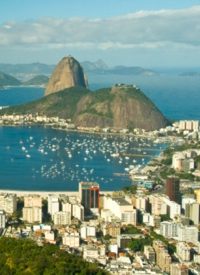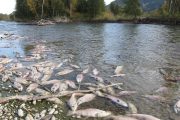
“Sustainability” is often promoted by supporters as protection of the environment for future generations. But to critics — especially in the United States, where suspicions of "Agenda 21" and the global body run deep — it is a term used by the UN and its backers to conceal a much more sinister agenda: Perpetually expanding government control over natural resources and economic development while individual liberty is curtailed and power is consolidated at the global level.
According to chief Andre Correa do Lago of Brazil’s delegation working on the outcome document for “Rio+20” — the upcoming UN conference is set for 20 years after the first Earth Summit was held in the Brazilian city — climate change and global warming have become too sensitive of an issue for many countries. Sustainability, on the other hand, is an idea all governments can rally behind, he told the Associated Press.
“Climate change has very strong resistance from sectors that are going to be substantially altered, like the oil industry,” explained Correa do Lago, apparently unaware that some of the world’s biggest oil interests have long rallied behind global-warming theories and proposed policies like cap and trade. “The feeling we have, when we are discussing with such different countries, is that sustainable development is the right answer.”
Concerns among populations and policy makers that the economic crisis could overshadow the UN summit and even throw a wrench in the global body’s goals have been running rampant, experts and negotiators said. That is why, according to Correa do Lago, sustainable development must be perceived as helping rather than hindering the economy.
“We know we have an environmental crisis, we have a financial crisis, we have a job crisis, we have many crises at the same time now, in some countries many of these crises together and the fact is that sustainable development is the answer to that,” Correa do Lago claimed. “To really make a change it has to have an economic logic, that’s why we come back to the issue of having sustainable development as a paradigm for the economic sector.”
The senior Brazilian negotiator told Reuters that “sustainability” was an easier sell than climate-change theories, which have come under increasing fire as glaring errors in the UN’s own reports continue to be discovered by scientists. Global climate conferences have repeatedly met with failure despite vast amounts of public resources poured into the campaigns.
Critics of UN-led sustainability efforts, however, warn that global policies aimed at reducing consumption and increasing government control over the economy will actually aggravate to economic crisis. And it’s even worse than that, according to American Policy Center President Tom DeWeese.
“I will tell you now, if you want to keep your guns, your property, your children and your God — if you love liberty — then sustainable development is your enemy,” DeWeese told a crowd at the Freedom 21 Conference, noting that the term was used to conceal a vast agenda that includes government control over all aspects of human life. “Sustainable development: It's a life plan — planned by someone else.”
And despite low expectations for the Rio+20 conference by some pro-sustainability activists, policy makers are setting ambitious goals for the confab. Executive coordinator of the UN summit Brice Lalonde, a former Green Party leader, said the gathering “must be the place where decisions on the future of the planet are made,” according to a report in the U.K. Guardian.
“Most topics are on the table: from efficient international co-operation to sustainable development goals, from a regular review of the state of the planet to an agency for the environment, from universal access to energy to social safety floors,” the socialist activist who also served as French Environment Minister was quoted as saying after a draft of the UN summit declaration was released on Thursday. He called the preliminary document a good start.
“What is missing now is one verb: to decide,” Lalonde added. “Because to stress, urge, call, recognize, underscore, encourage, support or reaffirm is not enough. When heads of state meet, it should be to decide." Pro-UN activists echoed the call to tough action.
Other conference leaders similarly demanded that wide-ranging decisions be agreed to in Rio later this year. UN CSD Secretary General Sha Zukang, who served as a senior diplomat in the communist dictatorship ruling mainland China for nearly four decades and also leads the UN Department of Economic and Social Affairs, was particularly vocal about his ambitions for Rio following the release of the draft declaration.
“When world leaders gather in Rio in five months, we need to present them with an ambitious and yet practical outcome that equals the magnitude of today’s challenges,” he said in a statement released by the UN. “We need a robust outcome from Rio+20, with reinvigorated political commitments by all countries. We need strong decisions — strong in commitments and strong in actions.”
According to a UN document about the conference agenda cited by the Guardian, governments assembled in Rio will be asked to support 10 new “sustainable development” goals at the conference while pledging to build so-called “green economies.” But unlike at the 1992 Earth Summit, leaders will not be asked to ratify legally binding agreements — widely seen as an impossibility considering strong opposition to UN goals in key governmental bodies like the U.S. Senate, which must approve all treaties affecting America. Instead, “voluntary” pledges will be sought.
"Unsustainable development has increased the stress on the earth's limited natural resources, and on the carrying capacity of ecosystems,” claims the 20-page document quoted by the newspaper, celebrating “green” progress over the last 20 years but warning that more should be done. The report also said national governments had largely failed to meet the commitments made at the first Earth Summit.
“Food insecurity, climate change and biodiversity loss have adversely affected development gains,” the draft document added. “We are deeply concerned that around 1.4 billion people still live in extreme poverty and one sixth of the world's population is undernourished, pandemics are omnipresent threats."
At the Rio+20 summit, the world’s national governments will be asked to erect a new international mechanism dealing with oceans, establish a major new global environment agency while beefing up existing bodies, appoint an “ombudsman” for future generations, and agree to an annual “State of the Planet” proclamation, according to information obtained by the left-leaning British newspaper. But the agenda could change over the next five months as governments haggle over the details.
Another one of the key goals at this year’s summit will be to get the private sector to increase its support for sustainability efforts, according to reports. But that should not be a tough task; senior executives with major firms have already told The New American that their companies are rallying behind “sustainability” all the way.
The UN CSD and the Earth Summit 2012 will take place in Rio de Janeiro from June 20 to June 22. The gathering is expected to attract high-level representatives from every major government in the world, countless special interest groups, top corporations, lobbyists, and reporters from around the globe.
Photo: Rio de Janeiro
Related articles:
Socializing at Rio: Socialists Run the Earth Summit
Socialist International in Copenhagen: "Birth of Global Governance"
Former Obama Green Jobs Czar Works to Endow Earth with Human Rights
What are the UN’s Agenda 21 and ICLEI?
Rockefellers Fund Global-warming Protests as Earth Cools
Your Hometown & the United Nations’ Agenda 21
From Rio to Copenhagen: The Earth Summit’s Legacy
County in Washington Ditches Sustainable Development
World Government: The UN Eco-Agenda for Planetary Control
UN Demands $76 Trillion for “Green Technology”
Sustainable Development Means a Wrenching Transformation of Your Life


